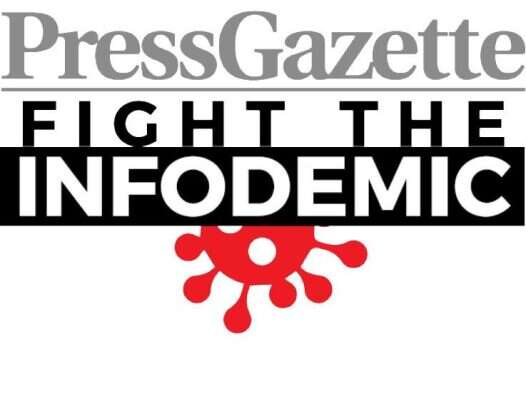
A global group of doctors is pleading with social media companies to help them combat the ‘infodemic’ of coronavirus misinformation on social media.
Medical professionals from the UK, US and Portugal have submitted evidence to British MPs in which they blame online falsehoods for harming sufferers of the disease.
More than 2,000 health professionals and supporters have also now signed an Avaaz campaign letter asking social media firms to “correct the record on health misinformation” by “alerting and notifying every single person who has seen or interacted with health misinformation on their platforms, and sharing well-designed and independently fact-checked correction”. They also want platforms to “detox the algorithms that decide what people see”.
Separately, Press Gazette last week launched a campaign, Fight The Infodemic, calling on social media companies to crackdown on misinformation around coronavirus and provide more support and promotion to professional evidence-backed journalism.

As part of the Avaaz campaign doctors submitted several pieces of evidence to Parliament’s Digital, Culture, Media and Sport Sub-committee on Online Harms and Disinformation.
‘Misinformation spreading unchecked on social media costs lives’
Ricardo Mexia, president of the Portuguese Association of Public Health Doctors, said: “The term ‘infodemic’ coined by the WHO fails to describe the magnitude of the problem we are facing with misinformation.
“I have been required to explain, time and again, that we shouldn’t rush to the pharmacy to buy X (replace X with any of the drugs that have been portrayed as the cure), that there is no conspiracy to take away our civil liberties, or that using a mask doesn’t cause lethal hypoxia (have we undergone surgery by hypoxic masked surgeons for decades?). These are just a few examples of the challenges we are facing on a daily basis.
“Misinformation spreading unchecked on social media costs lives and we need stern action to avoid those preventable deaths. It is our collective responsibility to make sure that information being delivered or shared with the public doesn’t lead them to risk their lives or the lives of those close by, particularly the most vulnerable ones.
“It is not a matter of freedom of speech. It is a matter of freedom to live and let live.”
‘We would appreciate social media companies standing behind us in this fight’
Meenakshi Bewtra, assistant professor of medicine and epidemiology at the University of Pennsylvania, said that Covid-19 falsehoods have fueled “inaccurate and dangerous practices, as well as a backlash against valid science and the scientists who stand up for the facts”.
She said: “We are frontline healthcare workers and scientists. We are working around the clock to save lives. The wealth of misinformation increases our work; it places our lives in danger; and adds additional stress and emotional and mental toll to all of us.
“Social media sites should feel the same responsibility to prevent the dissemination of misinformation; and have corrections in place when it happens. We would appreciate social media companies standing behind us in this fight.”
Siema Iqbal, a GP in the UK, said: “There have been conspiracy theories amongst the Asian communities regarding Covid mostly stemming from fear, but this has led to a lot of misinformation. Common theories include that doctors are trying to kill patients in hospital and to avoid hospitals at all costs.
“Messages, usually anonymous, have been shared on WhatsApp seemingly of relatives writing about the way their family members have been treated in hospital, left to die or given an injection (sometimes referred to as the Covid vaccine) and that has killed them.
“This has led to patients refusing to go into hospital and deterred them from seeking medical help early rather than later. It has also made dealing with family members who have loved ones in hospital difficult to manage as they feel adamant that the doctors are actively trying to harm them or discharging them without treating them.”
‘Disinformation has been the virus’ key ally in enabling its carnage’
Duncan Maru, an epidemiologist and physician at the Arnhold Institute for Global Health, Icahn School of Medicine at Mount Sinai, believes that neighbours of his in Queens, New York, have died because the US government did not act fast enough to contain coronavirus.
He suggests that this response was “informed by online conspiracy theories and because of fake news stories claiming that Covid-19 was created by the government of China, that social distancing measures are ineffective, that closures of non-essential businesses are a political plot, or that certain ethnicities are either immune or more likely to spread the disease”.
He added that the “viral spread of disinformation about unproven home therapies has also enabled the virus to spread more quickly. As a result, I’ve seen patients present too late for the care they need to survive. Colleagues of mine have even witnessed and treated patients suffering from consuming disinfectants after reading online that this was a way to cure COVID-19”.
Maru concluded: “Disinformation has been the virus’ key ally in enabling its carnage. It is both deadly and deeply disrespectful to health workers on the frontlines and our patients.
“We can’t be fighting lies and saving lives at the same time. As an American citizen, I ask that you protect your own citizens from the callous disregard for public health of American companies like Facebook. We need help desperately in holding tech companies accountable who profit by allowing these lies to spread and to harm.”
Rajeev Fernando, an infectious disease specialist from New York who traveled to Wuhan, China, to investigate Covid-19 in January, said: “Since we’re in a global economic recession, we need to trust in science and reopen the economy based on facts. As a doctor on the frontlines, I’m battling two challenges: trying to save the lives of ICU patients succumbing to the virus and tackling the infodemic. Millions are believing in pseudoscience, fictional documentaries and disproved medical treatments from social media.”
He added: “One of the biggest obstacles and challenges I face in informing people about COVID-19 is the public’s belief in conspiracy theories about the origin of the virus and bogus cures.”
Picture: Image shared on Facebook by individuals who believe Covid-19 is a conspiracy and questioning whether social distancing measures are necessary.
Email pged@pressgazette.co.uk to point out mistakes, provide story tips or send in a letter for publication on our "Letters Page" blog
